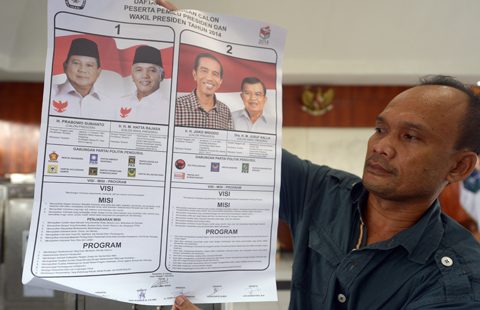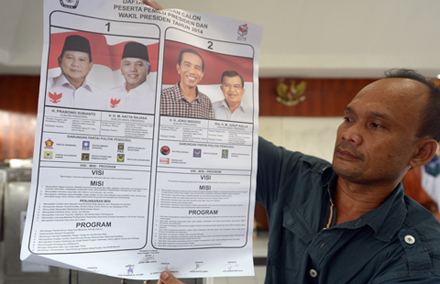As Indonesia heads to the polls, another chapter in a riveting story unfolds.
It is time. The official campaign for Indonesia’s next president ended on Saturday. Voting begins tomorrow.
New Mandala’s Indonesia Votes site was launched in March, on the day the official campaign period began. Since that time we have published over 100 posts.
In an industry where scholarly books and articles, grants and academic conferences are the metrics of academic ‘output’, devoting so much of our time to blogging is (as one of our editors put it) “career suicide”.
But it’s all been worthwhile – not just in terms of following the campaign, but getting into the finer details of the decisions Indonesia faces in its election year. Tomorrow’s vote represents the next gripping chapter in this story.
In the lead-up to the legislative elections, we sought perspectives from across the archipelago. We showed the experience of voting in regions like Aceh, Papua, Bali and Sulawesi. We charted new attempts to politically engage – from donuts to witchcraft to expats left on the sidelines. As well as old ways. We tried to provide colour, humour and well… whatever else came our way.
One of our biggest hits early on was ANU PhD student Tom Power’s piece on caleg cantik, and the politics of attractive female candidates. There are clearly a lot of (presumably men) on the Internet searching for this stuff.
As the results of the legislative elections unfolded, we discussed the Jokowi ‘effect’, why it was limited and the accuracy of the polls. Maybe it was the triumph of hope over sense? We wondered what kind of coalitions were to come? Did the Islamic parties’ strong result show resurgence or just the resilience of their party machines? Are Indonesia’s parties ideological or pragmatic? Was Aceh’s election free and fair? Did women candidates do better or worse this election?
As the Presidential candidates’ campaign entered full flight, we published on the use of symbols by the candidates, their strengths (sometimes literal), their emerging policies, and campaign styles.
A number of pieces received huge following. Usman Hamid’s comparison of candidates’ human rights record and John Roosa’s essay on the historical legacy of Sukarno for example.
As the race tightened, election talk increasingly centred around Prabowo. As Jokowi’s phenomenal media status lost its gloss and his lead in the polls narrowed, a Prabowo presidency suddenly, and for the first time, became a real possibility. We received a number of submissions that detailed what this might mean for Indonesian democracy.
This included a powerful and lengthy article by leading scholar of Indonesian politics, Professor Edward Aspinall, based at ANU, who argued a Prabowo presidency would be a major setback for Indonesia’s democracy.
Aspinall was not alone in his view. It was echoed by his colleague and another leading scholar of Indonesian politics, Marcus Mietzner, by UWA Professor David Bourchier, elsewhere by Dr Dave McRae, and indeed by other Indonesians either in the Indonesian media or further afield.
Around the same time as we published these pieces, increasingly, progressive elements in Indonesian civil society, Indonesian intellectuals, (and indeed, the Jokowi campaign) began to characterise the election as a struggle between reformist forces and a return to authoritarianism.
The authors who have been generous enough to choose New Mandala as a platform for their work are those who care deeply about the endurance and quality of Indonesian democracy, and have in some cases devoted much of their professional lives to the struggle for human rights and political freedom.
All of us in the editorial team agree that this election is crucial for Indonesian democracy. As The Economist put it, Indonesia is at a crossroads, (yes really Homer Simpson).
Put simply, we’ve tried to explain why this is the case.
At the same time, we have not given Jokowi a free ride. We have critiqued his new, uncomfortable role as a ‘party man’, his weak policies, his chaotic and disorganised campaign, and the dubious human rights records of his campaign team members.
We are conscious too of how scholarly work can be politicised. The nature of the campaign has meant any content can be manipulated and used by political parties. Our early discussion of how Peter Carey’s scholarship was used in the Gerindra campaign showed how the work of academics can be politically manipulated. Last week, in the final days of the campaign, Gerindra’s video projected Carey up on the big screen, praising Prabowo’s heritage.
If tomorrow the majority of Indonesians vote to give Prabowo a chance to implement his political vision, we welcome submissions that make ‘the case’ for Prabowo’s presidency and probe his leadership over the coming five years, or more.
We hope New Mandala has contributed to a deeper understanding of Indonesia’s elections, to displaying the unique and comprehensive quality of academic scholarship on Indonesia, at The Australian National University where we are based, and across the world.
Our authors have been from a variety of backgrounds, some professors of Indonesian studies, and experts in their field. Other contributors have been graduate students, NGO workers, professionals, independent researchers and journalists. We have strived to publish as many voices as possible – Indonesian and international – over the last four months.
Our coverage of the election culminates tomorrow in a live blog from contributors in Jakarta, Sulawesi, Canberra and Perth. We’d love to hear from you, either in the comments on the blog or through our twitter feed @indonewmandala. But as the situation seems unlikely to be resolved on Wednesday, we won’t be pulling up stumps just yet.
If you have any statements about our coverage (good or bad), feel free to write them at the bottom of this post, or in an email to indonewmandala@gmail.com
Happy voting tomorrow, Indonesia. Whatever the result, it has been a fascinating campaign to cover, and the next five years are sure to see a high demand for analysis and discussion of Indonesian social and political currents.
New Mandala’s Indo Votes editorial team consists of Jacqui Baker, Dominic Berger, Liam Gammon and Ross Tapsell, with support from James Giggacher.
 Facebook
Facebook  Twitter
Twitter  Soundcloud
Soundcloud  Youtube
Youtube  Rss
Rss 
